In order to understand what descriptive research is, one must first understand the different types of research methods. Descriptive research can be defined as a method used to describe something, usually in great detail. This type of research is often used in the sciences, such as in biology or psychology.
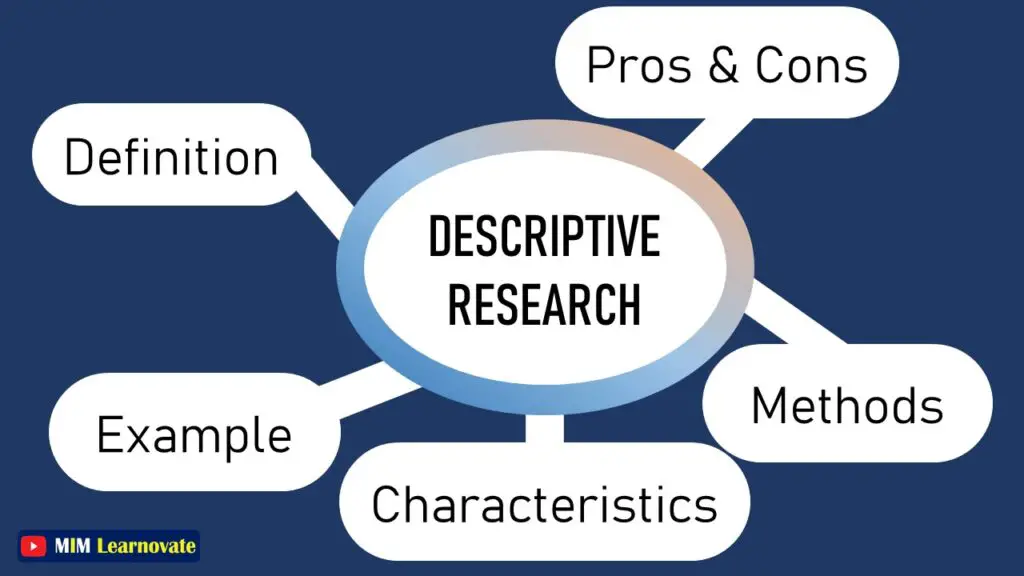
It can also be used in other fields, such as marketing or sociology. There are many different ways to collect data for descriptive research, lets take a look on examples, methods, types, pros and cons of Descriptive Research in this article.
What is Descriptive Research?
Descriptive research is a type of research that is used to describe a population or phenomenon. This type of research is often used in the social sciences, but can be used in other disciplines as well.
Descriptive research is often used to provide a snapshot of a population or phenomenon. It can also be used to answer questions about how something works or why something happens.
When doing a descriptive study, the researcher thoroughly details the circumstance or case in their research materials.
This kind of research design is entirely theoretical, and the researcher gathers data, analyses it, prepares it, and then clearly displays it. It is the type of study design that is the most inclusive.
Descriptive research can be either quantitative or qualitative in nature.
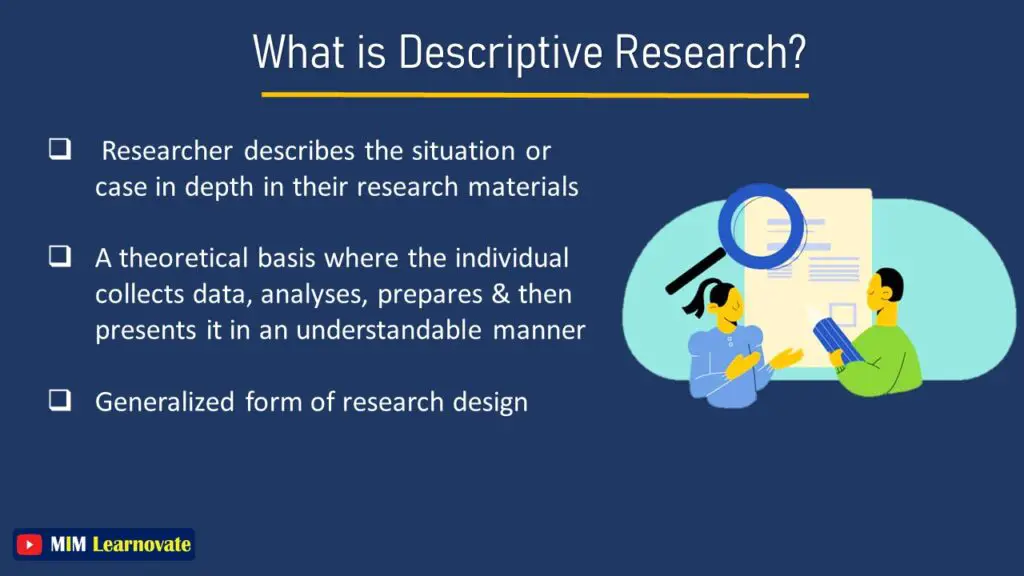
Quantitative descriptive research
Quantitative descriptive research involves collecting data that can be quantified, such as age, gender, income levels, etc. This type of data is typically collected through surveys or other means of data collection.
Qualitative descriptive research
Qualitative descriptive research involves collecting data that cannot be quantified, such as opinions, beliefs, attitudes, etc. This type of data is typically collected through interviews or focus groups.
Examples of Descriptive Research
- How the real estate market in London has transformed in the last 20 years ?
- Which product C or D are clients of firm A most interested in ?
- What distinguishes hybrid cows from Indian wild cows in terms of genetics, behavior, and morphology ?
- How common is illness 1 in population Z ?
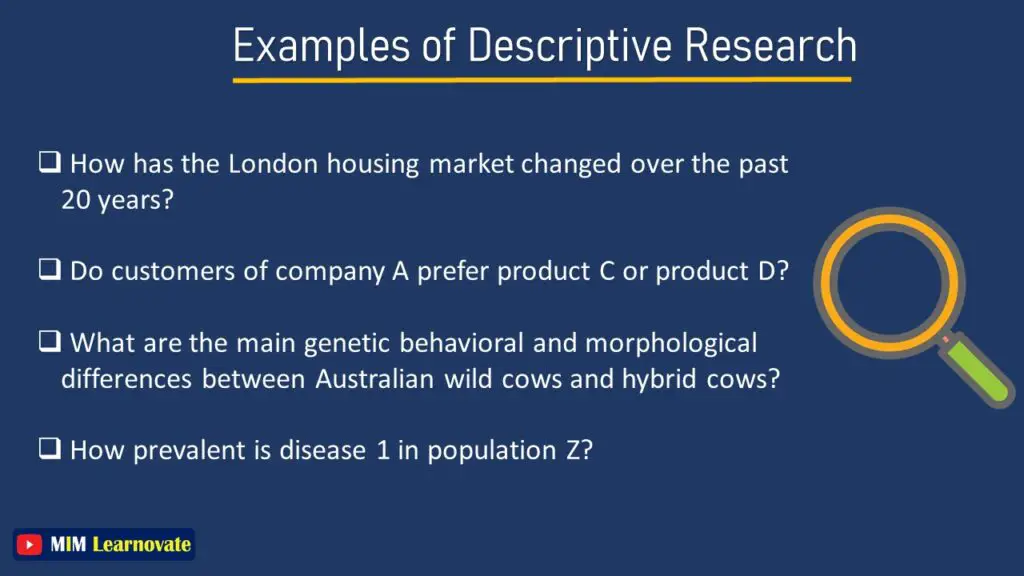
Characteristics of Descriptive Research
There are many different characteristics of descriptive research, which include:
Quantitative in Nature
In descriptive research, data is systematically and quantitatively collected so that the research problem may be statistically analyzed. It does not involve the manipulation of variables. This type of research is typically quantitative, meaning that it uses numerical data to describe the population or phenomenon.
Observational
Descriptive research is observational in that it simply observes and records what is happening. It does not try to explain why something is happening or to manipulate variables.
Uncontrolled Variables
Descriptive research differs from experimental research in that the variables are not managed or controlled. This is one of its most salient features. Instead, they are only recognized, scrutinized, and measured. It does not involve the manipulation of variables. This means that researchers cannot control what happens during the course of the study.
Basis for Further Research
The data gathered during descriptive research serves as a foundation for subsequent study since it aids in gaining a thorough grasp of the research topic in order to properly respond to it.
Cross-sectional Studies
Cross-sectional studies are typically used to do descriptive research. An observational study method known as a cross-sectional study involves obtaining data on various variables at the person level at a specific period.
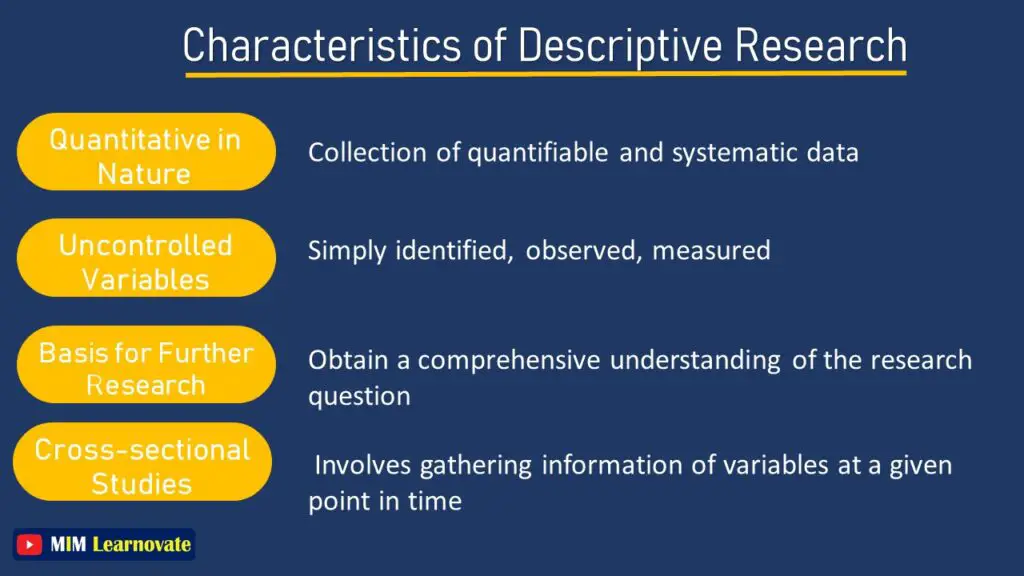
Pros of Descriptive Research
Comprehensive
Descriptive research frequently combines quantitative and qualitative methods, giving the research topic a more detailed knowledge.
Various Data Collection Techniques
The case study method, observational method, and survey method are just a few of the many data collection techniques that can be utilized in descriptive research.
Quick and economical.
High External Validity
As research is conducted in the respondent’s natural context with no variables being altered, results generated using the descriptive method of research frequently have high levels of external validity.
Quick and Inexpensive
Since surveys are frequently used in descriptive research, it is possible to quickly, cost efficiently and efficiently collect data from a fairly large sample size.
Cons of Descriptive Research
Unable to validate or test research question
Due to the fact that the data acquired does not assist in elucidating the reason of the phenomenon being examined, the descriptive technique of research cannot be utilized to test or validate the research problem.
Risk of Sampling Error
When choosing a sample group for a descriptive research study, random sampling is typically used. If the sample group isn’t representative of the larger population, chance may cause sampling error. Results from sampling mistake would be unreliable and unreliable.
Absence of Dependability
The data gathered could not be completely reliable if the research problem isn’t well-formulated. Additionally, this makes conducting a reliable investigation more difficult.
Possibility of False Responses
People’s reactions are crucial to descriptive research, especially when employing surveys. False responses may occasionally be given, which would undermine the reliability of the data gathered and, ultimately, the research’s conclusions.
Pros and Cons of Descriptive Research
| Pros | Cons |
| Comprehensive | Unable to validate or test research question |
| Various Data Collection Techniques | Risk of Sampling Error |
| High External Validity | Absence of Dependability |
| Quick and Inexpensive | Possibility of False Responses |
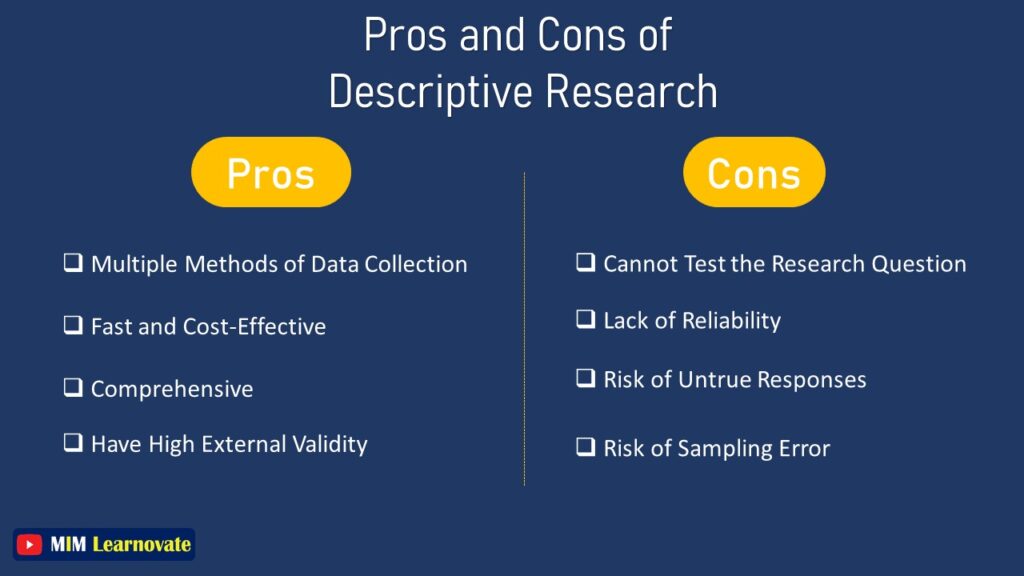
Why to use Descriptive Research?
Comparing Variables
Descriptive research can be used to compare various variables and the responses of various demographics to various variables.
Validate the Current Conditions
Given that it requires a thorough investigation of each variable before drawing conclusions, descriptive research can be an effective method for determining the validity of an actual condition.
Analysis of Data Trends
The descriptive research approach can be used to track changes in variables over time, enabling the discovery and analysis of trends.
Describe the Features of the Subjects
Additionally, it can be utilized to identify the various traits of the participants. This can include qualities, attitudes, behaviors, and other attributes.
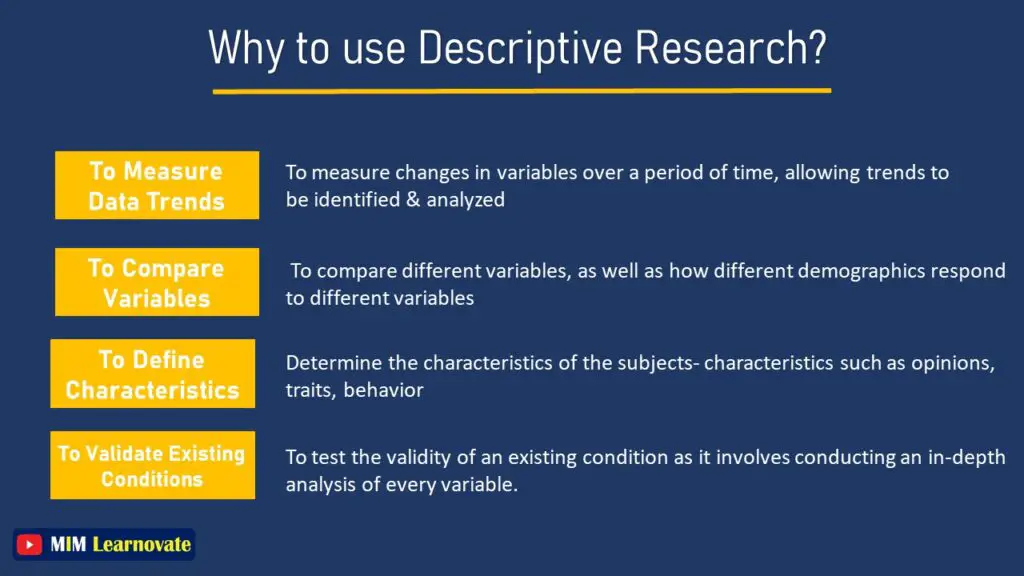
Methods of Descriptive Research
Descriptive research can be qualitative or quantitative in nature, and the researcher may choose to use one or both methods in order to best answer their research question(s).
There are many different methods that can be used in descriptive research, and the type of method used will often depend on the type of data being collected.
There are three key methods used to carry out descriptive research.
- Surveys
- Case study
- Observations
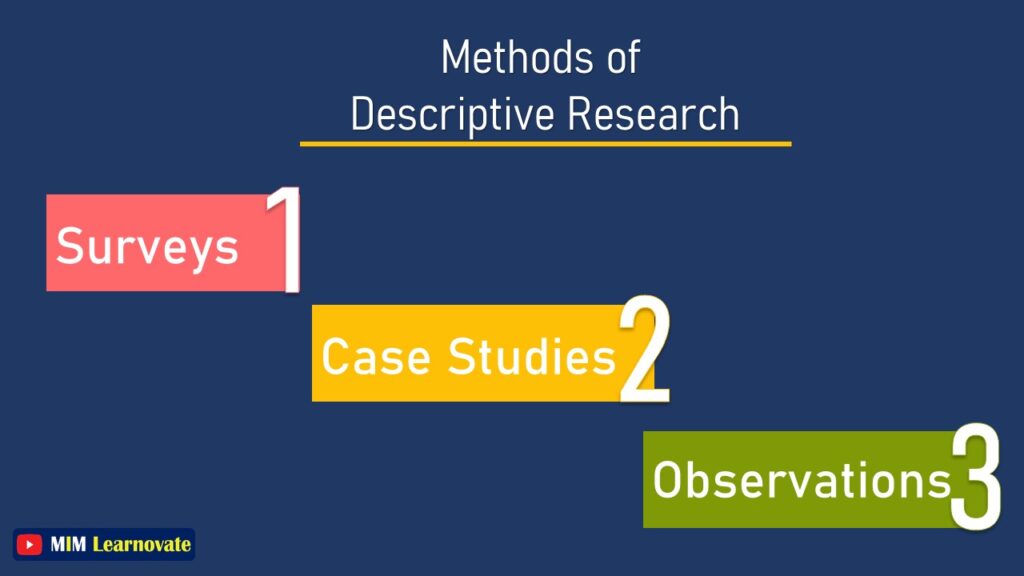
Surveys
Questionnaires or polls are used in survey research to get information from respondents on a particular subject. Since both have advantages, surveys should contain a mix of closed- and open-ended items. Because they may be conducted using a variety of digital and non-digital means, including email, websites, and phone surveys, surveys are a cost-effective technique of data collection.
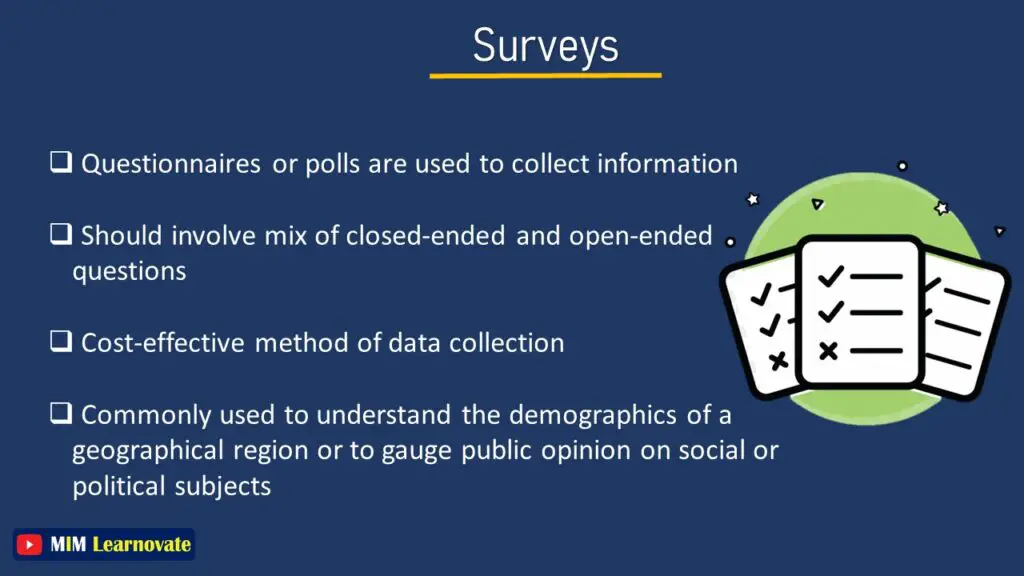
Case study
The case study method entails conducting extensive research on specific people or groups of people. Instead of acquiring a wide volume of data to find correlations and trends, case studies include gathering precise data on a specifically defined subject. Therefore, rather of describing facts that can be generalized, this method is frequently used to describe the various traits of a particular subject.
Researchers can develop hypotheses through case studies that can broaden the scope of evaluation when researching the phenomenon.
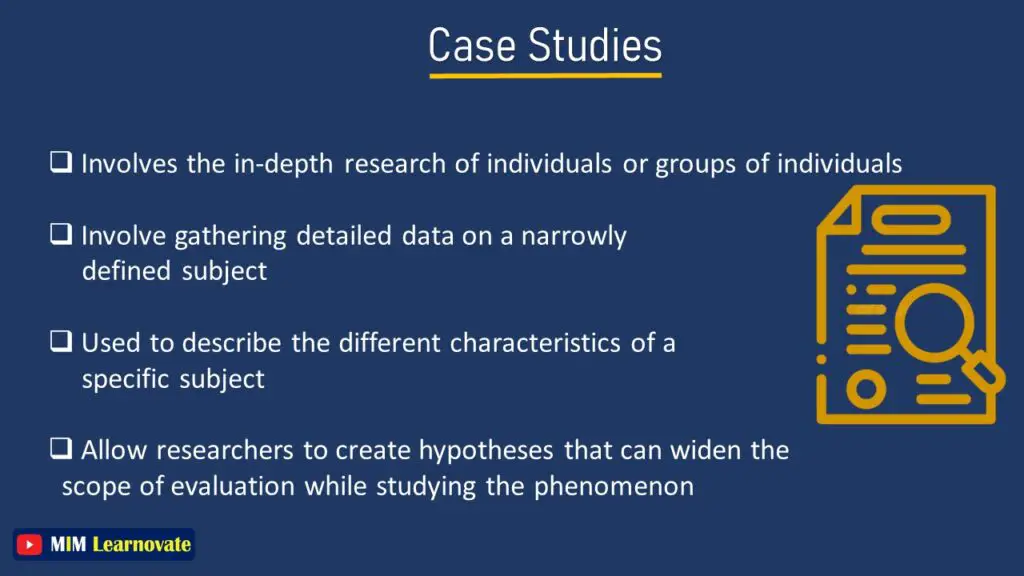
Observations
With this approach, researchers keep a distance from the subjects they are studying and observe them in their natural environment. This enables them to acquire data on the behaviors and traits under investigation without having to rely on respondents to provide truthful and precise answers.
The observational approach is thought to be the best one for conducting descriptive research. Both qualitative and quantitative data must be gathered.
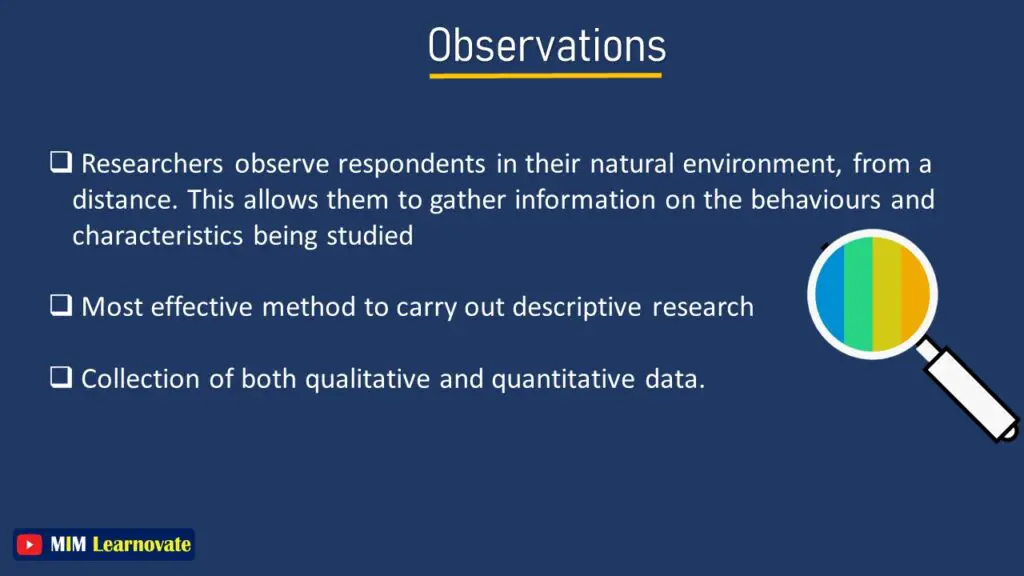
Conclusion
In conclusion, Descriptive Research is a type of research used to observe and describe phenomena. It is useful in providing detailed information about a specific event, behavior, or group. Although it cannot be used to draw causal relationships, it can be helpful in generating hypotheses for further research.
When deciding whether or not to use Descriptive Research, researchers should consider the pros and cons, as well as the specific research question they are trying to answer.
Other articles
Please read through some of our other articles with examples and explanations if you’d like to learn more about research methodology.
Statistics
Methodology
- Research Methods
- Quantitative Research
- Qualitative Research
- Case Study Research
- Survey Research
- Conclusive Research
- Descriptive Research
- Cross-Sectional Research
- Theoretical Framework
- Conceptual Framework
- Triangulation
- Grounded Theory
- Quasi-Experimental Design
- Mixed Method
- Correlational Research
- Randomized Controlled Trial
- Stratified Sampling
- Ethnography
- Ghost Authorship
- Secondary Data Collection
- Primary Data Collection
- Ex-Post-Facto
Research
- Table of Contents
- Dissertation Topic
- Synopsis
- Thesis Statement
- Research Proposal
- Research Questions
- Research Problem
- Research Gap
- Types of Research Gaps
- Variables
- Operationalization of Variables
- Literature Review
- Research Hypothesis
- Questionnaire
- Abstract
- Validity
- Reliability
- Measurement of Scale
- Sampling Techniques
- Acknowledgements




1 Comment
bookmarked!!, I really like your site!